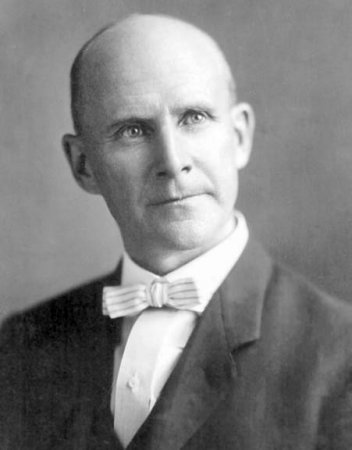Eugene V. Debs
Identification: Socialist labor leader
Born: November 5, 1855; Terre Haute, Indiana
Died: October 20, 1926; Elmhurst, Illinois
Significance: Perhaps America’s best-known socialist, Debs offered a strong critique of American capitalism during the late nineteenth and early twentieth centuries. His role as a strike leader—most notably during the Pullman Strike of 1894—and as a five-time candidate for president gained him both notoriety and a sizeable political following.
Although Eugene V. Debs was considered bright in school, his formal education ended in 1870, when, at the age of fourteen, he entered the employment of the Indianapolis Railway Company in Terre Haute, Indiana, first as a shop laborer and then as a locomotive fireman. This early experience fueled his interests in the rights of the working class and the embryonic labor movement. In 1875, Debs began serving as secretary of the local branch of the newly formed Brotherhood of Locomotive Firemen, and by 1880, he had become the secretary-treasurer of the national union as well as the editor of its publication, the Locomotive Firemen’s Magazine.
As the 1880’s progressed, labor strife throughout the country grew in response to the ruthless labor practices of the Gilded Age. In response, Debs became increasingly involved in the effort to bring about the federation of the major railroad unions. When this was finally accomplished in 1893 with the formation of the American Railway Union (ARU), Debs was chosen as the union’s president. In April of 1894, under Debs’s leadership, the ARU was successful in forcing James Jerome Hill and the Great Northern Railroad to submit to arbitration in a major labor dispute.
Mere months later, the union suffered a major defeat in the Pullman Strike of 1894, arguably the most significant effort of organized labor during the period. In the aftermath of this event, Debs was sentenced in Illinois to a six-month jail term for contempt. After supporting William Jennings Bryan in his unsuccessful bid for the presidency in 1896, Debs announced, on January 1, 1897, his conversion to socialism, seeing it as the best vehicle for achieving the types of economic reforms he felt the country required.
Eugene V. Debs. (Library of Congress)
For the rest of his life, Debs fought for the socialist cause, becoming the country’s best-known socialist leader. He ran five times for president as a socialist, in 1900, 1904, 1908, 1912, and 1920. Debs made his greatest impact in the 1912 presidential race, when he won 6 percent of the popular vote with a vote tally of 897,011.Hewas also one of the founders of the IndustrialWorkers of theWorld (IWW), a radical labor organization, in 1905, and he wrote extensively for the socialist publications Appeal to Reason and the National Rip-Saw.
Scott Wright
Further Reading
Chace, James. 1912—Wilson, Roosevelt, Taft, and Debs: The Election That Changed the Country. New York: Simon & Schuster, 2004.
Papke, David Ray. The Pullman Case: The Clash of Labor and Capital in Industrial America. Lawrence: University Press of Kansas, 1999.
Salvatore, Nick. Eugene V. Debs: Citizen and Socialist. Urbana: University of Illinois Press, 1982.
See also: AFL-CIO; Samuel Gompers; Industrial Workers of the World; labor history; labor strikes; Pullman Strike; Railroad strike of 1877; Railroads; Supreme Court and labor law.


